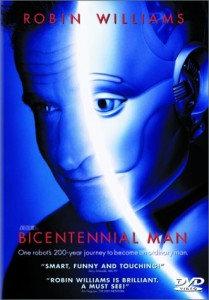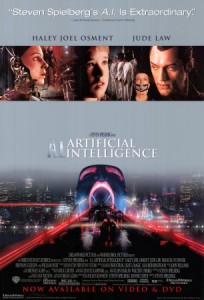The Human Machine?
Chapter 20 of our textbook outlines some very interesting concepts about artificial intelligence, such as the Turing test and the argument of strong versus weak artificial intelligence. According to the text, artificial intelligence (AI) is defined as a “special branch of computer science that investigates the extent to which the mental powers of human beings can be captured by means of machines.” Scholars in this field have been debating the potential “humanness” a machine currently possesses or will possess for the last fifty or sixty years. Proponents of weak AI claim that a computer will only ever be able to simulate a human mind, whereas proponents of strong AI claim that computers actually duplicate the mind. Turing sought to answer the question, “Can machines think?” with an experiment where a computer and an actual human response were alternatively given to an interrogator. If the interrogator was unable to consistently determine the human response, the computer, according to the test, could be said to think.
So what do you think? Will true artificial intelligence ever be realized? Is a machine’s ability to mimic human behavior or characteristics enough to classify it as a thinking being, or are there other factors that need to be considered as well? I know this is kind of random, but what about the issue of cloning (if that’s ever possible), would clones fall under the heading of natural or artificial or neither?




Kameron Allen on The Right Way Brain
10:05 am, 10.11.10
This is a very interesting topic to me as well. Are there benefits to increased right brain functionality as well as possible techniques to achieve this functionality? I believe there are, I’m just not sure what they could be.
Actually, Dr. Taylor’s video really reminded me of hallucinogenic drug experiments that I have read about where the participants claimed to have experienced reality how she did during her stroke, using descriptors such as “absolute oneness” or even “ego death.” Very crazy stuff, good post!
Kameron Allen on Perception, Apperception, and the Gorilla
9:35 am, 10.11.10
Wow, that video was really interesting. I caught the gorilla, but that was probably because I read about it in the post before watching it. It is crazy to think that we can really only focus on one aspect (usually) of a situation and ignore most other aspects of it. It makes me wonder what it would be like to have no filter and be able to perceive everything at once. Good post!
Kameron Allen on Thoughts on Behaviorism
9:10 am, 10.11.10
It really is unbelievable how many things we are influenced by based on pure observation. I still do many things that I observed and therefore learned as a child, today. Everything from our mannerisms to our style of dress have almost certainly been influenced by observation in some way. Good Post!
Kameron Allen on The Dollhouse's take on Tabula Rasa
10:32 am, 10.04.10
I noticed you mentioned that the psychotic doll’s personality developed in much the same way as it was before the slate was wiped clean: psychotic. I haven’t seen the show, but I wonder if the other ‘sane’ dolls personalities developed similarly to how they were before they were turned into actives? If this happened to us today, would we eventually turn out to be relatively similar to ourselves now, or become what our programmers wanted us to become? Great post!
Kameron Allen on Evolution v. Creation: One or the other or both?
10:18 am, 10.04.10
I am very inclined to believe that, although God did create the universe as we know it, he also gave creation the ability to evolve. Evolution enables creation to adapt to it’s environment and thereby gives it a better chance at survival. I think a lot of Christians actually limit God’s power when they deny the impact that evolution has had in various aspects of life, such as physical adaptations and even psychology. Why couldn’t God use something like evolution to fulfill His own purposes? Good post!
Kameron Allen on Is Perception Really Reality?
9:54 am, 10.04.10
I have asked myself this question many times, and, sadly, have never come up with a satisfactory answer. I used to wonder specifically about everyone else’s perception of color and if it matched mine. For example, is what I perceive as green actually orange to another person, or is yellow actually blue? I realize that this is kind of a ridiculous thing to ponder, but it is somewhat interesting to me nevertheless. Good post!
Kameron Allen on Dogma of Philosophy
3:40 pm, 09.20.10
I may be completely off the mark here, so I am really sorry if I am. I believe that a lot of dissension arises between these groups because they are all in a struggle for authority/power. I think each of those three have very compelling, and, as you mentioned, compatible views on truth, but they divide when one questions the authority of the other. I would say it was definitely an issue long before the Renaissance and it will probably continue to be an issue for many years to come.
Kameron Allen on Descartes and a revisitation of Plato
3:26 pm, 09.20.10
I completely agree with you that truth is a very personal decision. People have to make the decision that they are willing to at least explore truth. We can have other’s perceptions of truth shoved down our throats forever and it would ultimately mean nothing because we have not made the decision to seek the truth ourselves.
Kameron Allen on Infectious Ideas
12:32 pm, 09.20.10
I really liked your last paragraph where you mention the subconscious searching for confirmation of our ideas. I feel like that happens so much more than we acknowledge or even realize. We tend to perceive things that are relevant to our own thoughts and ideas and ignore those that are irrelevant. Sorry for the completely random thought and thanks for posting!
Kameron Allen on The Food Industry and Me
11:57 am, 09.06.10
I completely agree that our food industry is in a very bad state at the moment. My friends and I were just talking the other day about how odd it is that unhealthy food is ridiculously cheap while healthy food is comparatively expensive. I can get a large pizza (Little Caesar’s “Hot-N-Ready”) for five bucks while a gallon of milk at Whole Foods costs at least that much, if not more. That may not be a great comparison, but you get what I am saying.
Thanks for the post! I will definitely check out the farmer’s market here sometime.